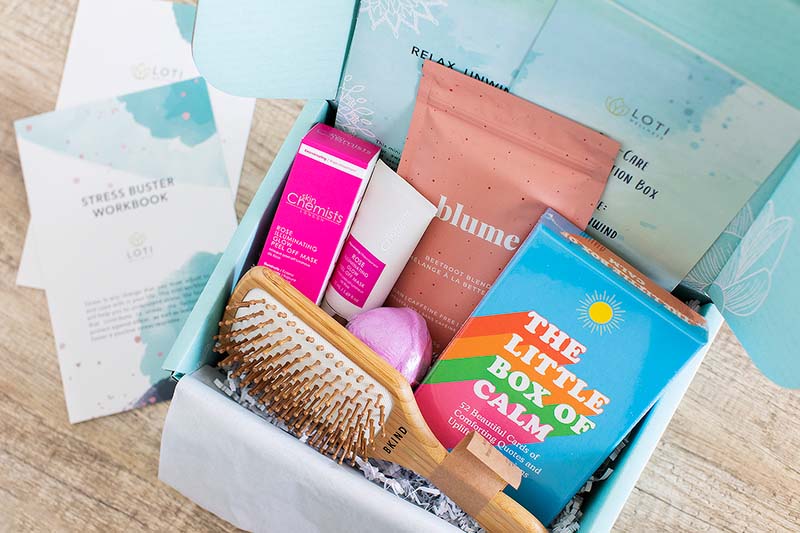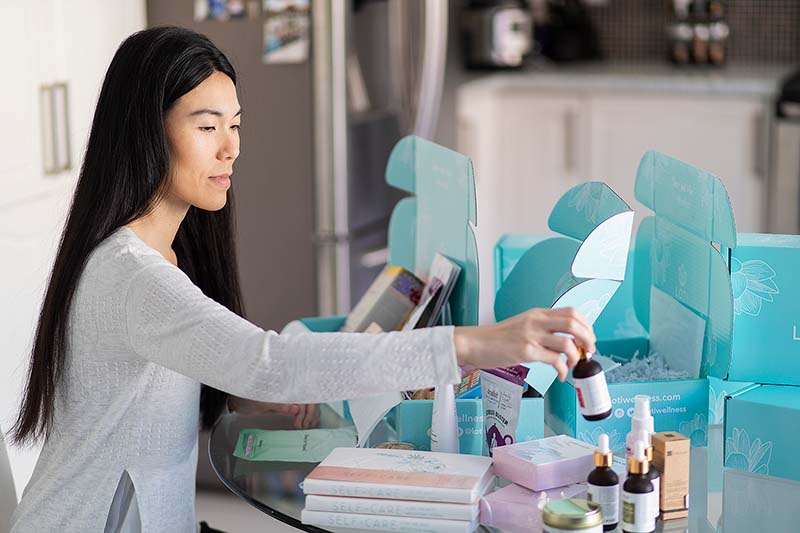Product
By Jim Magats, SVP, Payments and SMB Solutions
Billed as the “second pandemic,” mental health and wellbeing are top of mind for many. Even before the pandemic, more than 25% of U.S. adults were reportedly suffering from a diagnosable mental disorder. The numbers have only risen since the pandemic began. Mental health and wellness-related issues are also increasingly impacting SMBs. This is especially true as many small business owners, who rely solely on their business as their main source of income, have been impacted by the pandemic. In addition, entrepreneurs who are just starting their businesses are oftentimes consumed by work. I’ve heard from countless small business owners who manage everything from product development to marketing to customer service, which doesn’t leave much time to shut off and focus on general wellness.

Loti Wellness CEO and Founder Kitty Shum
I recently caught up with Kitty Shum, founder and CEO of Toronto, Ontario-based Loti Wellness, a subscription box service that aims to help people improve and maintain their mental health and wellbeing. Kitty is an occupational therapist by trade and initially started Loti Wellness as a side hustle. However, she became increasingly serious about the business and, by combining her decade of experience as an occupational therapist with her interest in entrepreneurship, she has been able to empower people to create a life of meaning and intention. I’m inspired by Kitty’s mission, and I hope you appreciate her story as much as I did.
Jim Magats: Can you talk about what inspired you to start your business and what is your mission?
Kitty Shum: As an occupational therapist, I have long understood the value of self-care, but when the pandemic hit, it became clear that sustaining mental health was fast becoming a national priority. I saw many subscription boxes on the market that were focused on grooming, but quickly realized there was a need for a subscription service that focused on the important work of self-care, which is more important than ever. So, I launched Loti Wellness in December of 2019. Our products focus on promoting a healthy lifestyle -- both physically and mentally. Being a mom of three kids also played a huge role in my decision to start this business – I wanted to be able to continue working, but also be able to spend time with my children.
Our vision at Loti Wellness is to inspire everyone to create a life of meaning and intention, and to find happiness from within so you can live life to its fullest. Along with our mission to nurture wellness, we are dedicated to raising awareness of mental health and providing education to reduce stigma. As part of our efforts, Loti Wellness is a proud supporter of the Mood Disorders Society of Canada’s Elephant in the Room Campaign – a national anti-stigma campaign designed to eliminate the stigma associated with mental Illness.
JM: You started your business just about two years ago. How are you reaching new prospects and keeping customers engaged? And which markets do you sell to?

Loti Wellness subscription box
KS: We’re always learning, researching and trying new sales methods that focus on customer engagement. We want new customers to feel excited about joining a program that can lead to better mental, emotional and physical health. Being a subscription business, we value our members and have built an online community around mental wellness and support. We communicate often with customers via emails, newsletters, blogs on mental health topics, sneak peeks of upcoming products, and proudly showcase our monthly box reveals. We encourage new customers and long-time members to reach out to us anytime, and we sincerely appreciate any feedback! We also ensure that our support channels are easy to access and use, whether via our online chat, social media or email, and always respond in a timely manner.
JM: How do you leverage social media to raise awareness/attract new customers for your business?
KS: Social media allows us to further connect with customers by checking in with them, asking them what they want, and how we can improve. We give our followers an insider look into some of the brands we feature in our subscription boxes, by sharing the stories behind the people and the products that make up the brand, and why they matter. We also connect with a lot of other small business owners that way! Finally, a lot of our customers and followers have become brand advocates by spreading news about our subscription boxes, our products and our mission through their own social media pages, which helps new customers to find us too.
JM: How has PayPal helped your business?
KS: PayPal is a secure checkout, and people expect to see it when they do online shopping -- so it was a no brainer for us. We wanted to offer PayPal as an option for our customers right from the start. As a customer, when I see PayPal, I use it. I knew many of my customers would feel the same way. PayPal is convenient and trustworthy. Especially starting out as a small business, when potential customers aren’t sure if they can trust you, leveraging trusted platforms like PayPal can really help customers feel comfortable checking out.
JM: The pandemic has impacted small businesses in a range of ways, including disrupting supply chains. Are the supply chain issues impacting your business? And how are you managing that?

Loti Wellness CEO and Founder Kitty Shum
KS: We’ve experienced massive delays receiving products, which obviously impacts the business. Many of the stores and suppliers I worked with weren’t able to get the products I needed to fulfill my orders, which meant that my customers were waiting a long time for their monthly subscription to come in the mail. We were honest with our customers, who were very understanding and compassionate. But we realized we needed to find a long-term solution to the supply chain issues.
First, we started shifting and planning schedules to give vendors a chance to source their products. Second, we decided to partner with very local vendors and local SMBs who were more established and would have an easier time filling bigger orders. Third, we also partnered with more shipping carriers. Together, these three strategies really helped us get around the supply chain issues and shipping delays.
JM: What advice do you have for other entrepreneurs looking to start their own business?
KS: It’s never easy to start a business. I recommend spending time researching your field and familiarizing yourself with the business landscape. I also have a business advisor, who has been pivotal in helping me make important business decisions. Lastly, I’ve found that connecting with other women entrepreneurs is incredibly helpful. There are so many people who are willing to share advice if you just ask.